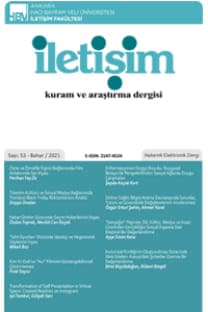Medya Arası Gündem Belirleme Kuramı Çerçevesinde Hürriyet ve Twitter Üzerine Bir Çalışma
A Study on Hürriyet and Twitter Within the Framework of Intermedia Agenda-Setting
___
- Basın İlan Kurumu, (2013). Yazılı Basın, Sosyal Medya Karşısında Eriyor, http:// www.bik.gov.tr/yazili-basin-sosyal-medya-karsisinda-eriyor-haberi-52499/. Accessed: 03.01.2015.
- Baxter, L.A. and Babbie, E., (2004). The basics of communication research, Australia: Thomson Wadsworth.
- Cohen, B.C., (1963). The press and foreign policy, Princeton, N. J: Princeton University Press.
- Dunn, S.W., (2006). Candidate and media agenda setting in the 2005 Virginia gubernatorial election. Master’s Thesis, Virginia Tech, Blacksburg.
- Habertürk (2013), http://www.haberturk.com/medya/haber/901758-gezi-olaylaritwittera-yaradi. Accessed: 06.04.2015.
- Hawksey, Martin, (2014). About, https://tags.hawksey.info/about/, Accessed: 05.02.2015.
- Ku, G., Kaid, L.L. and Pfau, M., (2003). “The Impact of Web Site Campaigning on Traditional News Media and Public Information Processing”, Journalism & Mass Communication Quarterly, 80, (3), p. 528–547.
- Kushin, M.J., (2010). Tweeting the issues in the age of social media? Intermedia agenda setting between the New York Times and Twitter. PhD Thesis, Pullman, WA: Washington State University.
- Lee, B., Lancendorfer, K.M. and Lee, K.J., (2005). “Agenda-setting and the internet: The intermedia influence of internet bulletin boards on newspaper coverage of the 2000 general election in South Korea”, Asian Journal of Communication, 15, (1), p. 57–71.
- Lee, G. (2005). Agenda setting effects in the digital age: Uses and effects of online media. PhD Thesis, The University of Texas at Austin, United States.
- Lopez-Escobar, E., Llamas, J.P., McCombs, M.E. and Lennon, F.R., (1998). “Two Levels of Agenda Setting Among Advertising and News in the 1995 Spanish Elections”, Political Communication, 15, (2), p. 225–238.
- McCombs, M.E., (2005). “A look at Agenda-Setting: Past, present and future”, Journalism Studies, 6, (4), p. 543-557.
- McCombs, M.E. and Bell, T., (1996). The Agenda-Setting Role of Mass Communication. In: Michael S. and Don S. (eds) An Integrated Approach to Communication Theory and Research. Mahwah, NJ: Lawrence Erlbaum Associates, pp.93-110.
- McCombs, M.E., Lopez-Escobar, E. and Llamas, J.P., (2000). “Setting the agenda of attributes in the 1996 Spanish general election”, Journal of Communication, 50, (2), p. 77–92.
- McCombs, M.E. and Shaw, D.L., (1972). “The Agenda-Setting Function of Mass Media”, Public Opinion Quarterly, 36, (2), p. 176-187.
- McCombs, M.E. and Shaw, D.L., (1993). “The Evolution of Agenda-Setting Research: Twenty-Five Years in the Marketplace of Ideas”, Journal of Communication, 43, (2), p. 58–67.
- Medyatava, (2016). Tiraj, http://www.medyatava.com/tiraj. Accessed: 23.06.2016. Melek, G., (2015). Medya Arası Gündem Belirleme Kuramı Çerçevesinde Hürriyet ve Twitter Üzerine Bir Çalışma. PhD Thesis, Ege Üniversitesi, İzmir. Monitera, (2013). 2013 Twitter Türkiye Profili, http://blog.monitera. com/2013/02/2013-twitter-turkiye-profili.html. Accessed: 24.08.2015.
- Palmgreen, P. and Clarke, P., (1977). “Agenda-Setting with Local and National Issues”, Communication Research, 4, (4), p. 435–452.
- Reese, S.D. and Danielian, L.H., (1989). Intermedia influence and the drug issue: Converging on cocaine. In: Shoemaker PJ (eds) Communication Campaigns about Drugs: Government, Media, and the Public. NJ: Lawrence Erlbaum, pp.29-46.
- Roberts, M. and McCombs, M.E., (1994). “Agenda setting and political advertising: Origins of the news agenda”, Political Communication, 11, (3), p. 249–262.
- Roberts, M., Wanta, W. and Dzwo, T.H., (2002). “Agenda Setting and Issue Salience Online”, Communication Research, 29, (4), p. 452–465.
- Rozelle, R.M. and Campbell, D.T., (1969). “More plausible rival hypotheses in the cross-lagged panel correlation technique”, Psychological Bulletin, 71, (1), p. 74–80.
- Shadish, W.R., Cook, T.D. and Campbell, D.T., (2002). Experimental and quasiexperimental designs for generalized causal inference, Boston: Houghton Mifflin.
- Shaw, D.L. and McCombs, M.E., (1977). The Emergence of American Political Issues: The Agenda-Setting Function of the Press, St. Paul: West.
- Sweetser, K.D., Golan, G.J. and Wanta, W., (2008). “Intermedia Agenda Setting in Television, Advertising, and Blogs During the 2004 Election”, Mass Communication and Society, 11, (2), p. 197–216.
- Tedesco, J.C., (2001). “Issue and Strategy Agenda-Setting in the 2000 Presidential Primaries”, American Behavioral Scientist, 44(12), p. 2048–2067.
- Tedesco, J.C., (2005). “Issue and Strategy Agenda Setting in the 2004 Presidential Election: Exploring the candidate–journalist relationship”, Journalism Studies, 6(2), p. 187–201.
- Tipton, L., Haney, R.D. and Baseheart, J.R., (1975). “Media Agenda-Setting in City and State Election Campaigns”, Journalism & Mass Communication Quarterly, 52, (1), p. 15–22.
- Türkiye İstatistik Kurumu, (2014). Hanehalkı Bilişim Teknolojileri Kullanım Araştırması, 2014, http://www.tuik.gov.tr/PreHaberBultenleri.do?id=16198. Accessed: 06.04.2015.
- Twitter, (2015). Transparency Report Removal Requests, https://transparency. twitter.com/removal-requests/2015/jan-jun. Accessed: 23.06.2016.
- Twitter Counter, (2017). Top 100 Followers in Turkey, http://twittercounter.com/ pages/100/turkey. Accessed: 19.02.2017.
- Vieweg, S., (2010). The ethics of Twitter research. Proceedings of the Computer Supported Cooperative Work, 27, p. 1–3.
- Wallsten, K., (2007). “Agenda Setting and the Blogosphere: An Analysis of the Relationship between Mainstream Media and Political Blogs”, Review of Policy Research, 24(6), p. 567–587.
- Yayın Aralığı: 3
- Başlangıç: 1983
- Yayıncı: Ankara Hacı Bayram Veli Üniversitesi İletişim Fakültesi
Gazeteler Üzerinden Darbeler: Kırgızistan 2010 Olaylarının Türkiye Basınında İnşası
Seçkincilik – Piyasa İkilemi: 1990’lı Yıllarda TRT’nin Programlarına Yönelik Eleştiriler
Şirin ATAKAN DUMAN, Emel OZDORA AKŞAK
Etnik Medya Kavramı Çerçevesinde Avusturya’da Türkçe Yayınlanan Gazeteler Üzerine Bir İnceleme
Hayat ZENGİN ÇELİK, İrem ERİN, Senem TEZCAN
Toplumsal Bı̇çı̇mler Okulunun İkı̇ Öncüsü Tönnies İle Simmel’ı̇n İletı̇şı̇me Katkısı
Doğan Holding’in Kurumsal Sosyal Sorumluluğuna Yönelik Bir Değerlendirme
